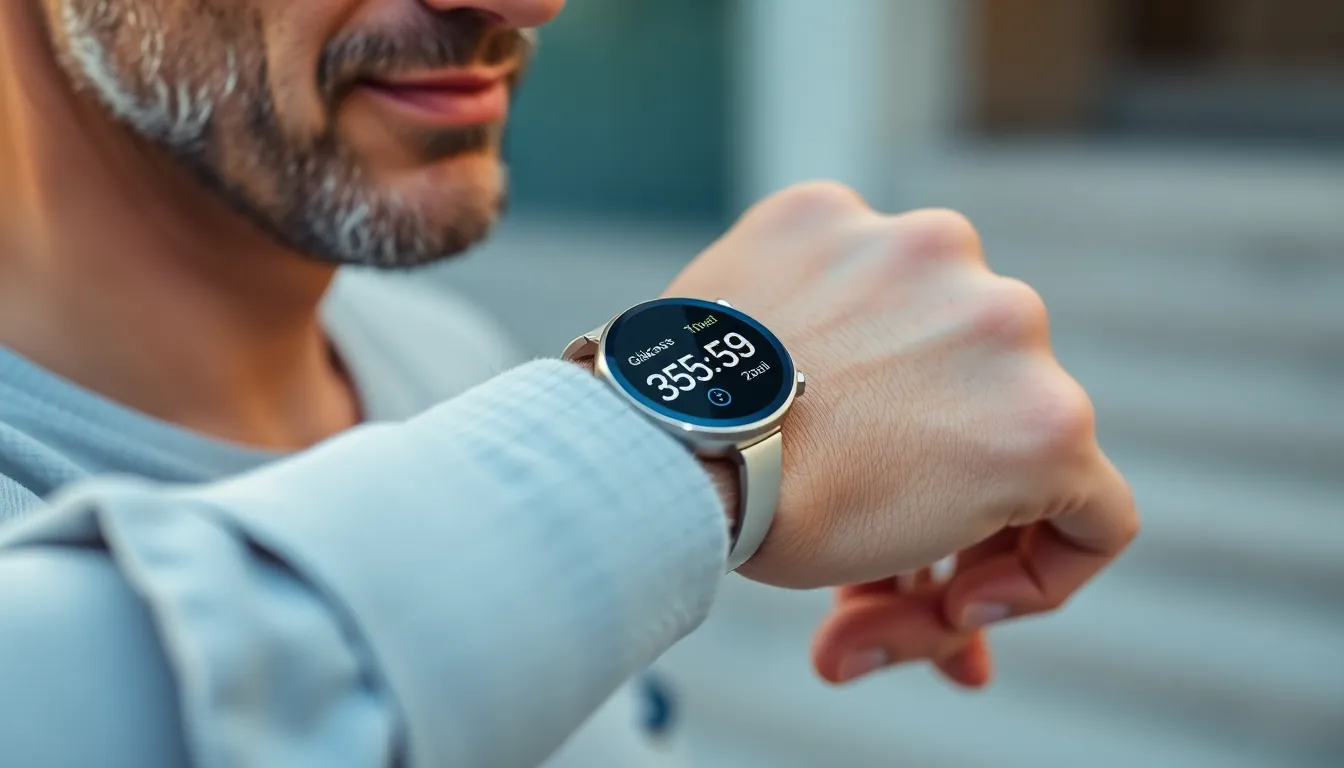Table of Contents
ToggleIn a world where everyone’s trying to be healthier while juggling their busy lives, smartwatches are stepping up their game. Imagine a device that not only tells time but also keeps tabs on your blood sugar levels. Yep, that’s right! The future is here and it’s wrapped around your wrist, ready to help you manage your health with a flick of your wrist.
Gone are the days of pricking fingers and carrying around bulky monitors. With these sleek gadgets, monitoring blood sugar is as easy as checking the weather. Whether you’re a tech guru or just someone looking to keep their health in check, these smartwatches offer a fun and practical solution. So why not let your wrist do the work while you focus on what really matters—like figuring out where you left your keys?
Overview of Smart Watches
Smart watches offer a range of innovative features tailored to health monitoring. These wearable devices integrate advanced sensors for tracking various bodily functions. Users can benefit from continuous monitoring of heart rate, activity levels, and sleep patterns.
Recent developments have enhanced smart watches’ capabilities, particularly in diabetes management. Some models are capable of measuring blood glucose levels through non-invasive methods. These advancements eliminate traditional pricking methods, providing a more comfortable experience.
Numerous brands have started incorporating these features into their products. For example, brands like Apple and Samsung lead the market with their health-oriented models. They focus on seamless integration with health apps to track and store user data conveniently.
Smart watches also allow users to receive real-time alerts. Notifications can signal critical changes in glucose levels, which helps users respond promptly. This proactive approach promotes better health management and encourages lifestyle adjustments when necessary.
Battery life varies among models, with some offering multiple days of usage. Longer-lasting batteries support continuous glucose monitoring and prevent interruptions in tracking.
Customization options enable users to tailor their devices to suit personal preferences. Watch faces, bands, and app layouts can adjust to improve user experience. Features like reminders for glucose checks and medication intake further enhance smart watches’ practical applications.
Data collected by these devices can sync with smartphones, allowing for easier trend analysis. This integration aids healthcare providers in understanding patients’ habits and developing personalized care plans.
Benefits of Using a Smart Watch to Monitor Blood Sugar

Smartwatches offer significant benefits for individuals managing blood sugar levels. They enhance diabetes management through innovative technology.
Continuous Monitoring Features
Continuous glucose monitoring enhances awareness of blood sugar trends throughout the day. Smartwatches equipped with advanced sensors provide real-time data. This allows users to make informed decisions about their diet and exercise. Non-invasive measurement methods eliminate the discomfort associated with finger pricking. Many users report greater confidence in managing their diabetes when using these features. Regular tracking promotes proactive health management, reducing the risk of complications.
Integration with Health Apps
Integration with health apps streamlines the monitoring experience. Smartwatches sync data effortlessly with smartphones, providing a comprehensive overview of health metrics. Users can access trends and patterns in glucose levels easily. Health apps often allow customization of alerts, reminding individuals to check their blood sugar. Many platforms facilitate communication with healthcare providers. This enables the development of personalized care plans, enhancing overall management of diabetes.
Featured Smart Watches on the Market
Smartwatches designed for monitoring blood sugar levels provide innovative solutions for diabetes management. This section highlights popular models available today.
Smart Watch 1: Features and Pricing
The Apple Watch Series 8 stands out for its advanced health features, including non-invasive blood glucose monitoring through integrated sensors. Users benefit from continuous heart rate tracking, sleep analysis, and fitness activity monitoring. Priced at approximately $399, this model includes seamless integration with the Apple Health app for data tracking and sharing.
Smart Watch 2: Features and Pricing
The Samsung Galaxy Watch 5 offers robust features tailored for health enthusiasts. It includes advanced sensors for glucose monitoring, along with heart rate and blood pressure tracking. Available for around $329, this smartwatch syncs data with the Samsung Health platform, allowing users to manage their health metrics effectively.
Smart Watch 3: Features and Pricing
Fitbit Charge 5 focuses on health and fitness, featuring an intuitive interface for tracking blood glucose levels. In addition, it monitors activity, heart rate, and sleep quality. Priced at about $179, this model integrates with the Fitbit app for personalized insights and health management, making it an affordable option for health-conscious users.
User Experience and Feedback
Users report high satisfaction with smartwatches designed for blood sugar monitoring. Many find these devices effortless to use, relying on real-time data to manage their diabetes effectively. Custom alerts for glucose checks simplify routine management, and wearable technology promotes a proactive approach to health.
Real-time alerts significantly enhance the user experience. Individuals appreciate receiving immediate notifications regarding changes in glucose levels, allowing for timely adjustments to diet or activity. Continuous monitoring creates confidence, as users feel more in control of their health.
Integration with health apps garners positive feedback. Customers enjoy accessing trend data and patterns in their glucose levels through a user-friendly interface. Synchronization with smartphones provides valuable insights for both users and healthcare providers, facilitating discussions about personalized care plans.
Battery life emerges as a notable feature. Users favor models with longer-lasting batteries that support uninterrupted monitoring for multiple days. Convenience in daily life is crucial for effective diabetes management, and smartwatches cater to this need.
Many owners actively share their experiences online. Reviews frequently highlight the Apple Watch Series 8 for its advanced health features, non-invasive glucose monitoring, and sleek design. Others commend the Samsung Galaxy Watch 5 for its robust functionality and price point. Feedback on the Fitbit Charge 5 emphasizes its user-friendly interface, making it suitable for various demographics.
Regular tracking through smartwatches equips users for informed decision-making. Improved awareness of blood sugar trends fosters a healthier lifestyle, encouraging better dietary choices and consistent exercise routines. Overall, the shift towards smartwatch technology for diabetes management indicates a promising evolution in personal health monitoring.
Smartwatches are revolutionizing diabetes management by offering convenient and innovative solutions for blood sugar monitoring. With features like non-invasive glucose tracking and real-time alerts, these devices empower users to take control of their health effortlessly. The integration with health apps further enhances the experience, allowing for personalized insights and streamlined communication with healthcare providers.
As technology continues to advance, smartwatches will likely play an even more significant role in health management. Their ability to provide continuous monitoring and actionable data fosters confidence among users, promoting healthier lifestyles. Embracing this technology can lead to better health outcomes and an improved quality of life for individuals managing diabetes.











